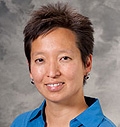
Jennifer Edgoose, MD
Research and a teaching tool developed by the DFMCH’s Jennifer Edgoose, MD, MPH, were featured in a recent Wall Street Journal (WSJ) article on the challenges of providing care for “difficult” patients.
The article explained how patients who are aggressive, demanding, or who ask for many tests that doctors may deem unnecessary are not only challenging, but also have an increased risk of misdiagnosis because their behavior distracts doctors.
Difficult patients may have multiple symptoms or conditions, chronic pain, or mental-health disorders. They may use more health-care services than other patients, yet have unmet expectations for their care.
Yet, a 2014 study led by Dr. Edgoose and published in Family Medicine found that difficult patients found it easier to communicate with their provider than patients who weren’t labeled difficult.
“Interestingly, we realized these patients who are considered difficult by their provider actually adore their physician,” she said in the WSJ article.
She theorizes that the residents in the study who cared for those patients may have expended extra time and energy—perhaps out of a sense of guilt for finding the patients “difficult”—that they felt more tired and burned out. But the patients were happy to receive the extra attention.
The article also profiled strategies that doctors use to handle difficult patients. One was a teaching mnemonic Dr. Edgoose developed called BREATHE OUT.
The mnemonic prompts health professionals to ask themselves a series of questions before and after a visit with a difficult patient. The questions help doctors identify their own potential biases, reflect on why they consider the patient difficult, articulate and carry out their agenda for the visit, and identify what to address in the next visit.
“It’s meant to be a structured, clinical tool to support clinicians overwhelmed by these challenging patients,” Dr. Edgoose commented.
In 2015, she also tested the mnemonic with 57 health professionals and found those who used it were more satisfied with difficult patient encounters than those who didn’t. Results from that study were published in the Journal of the American Board of Family Medicine.
Read the full Wall Street Journal article
Published: April 2016
